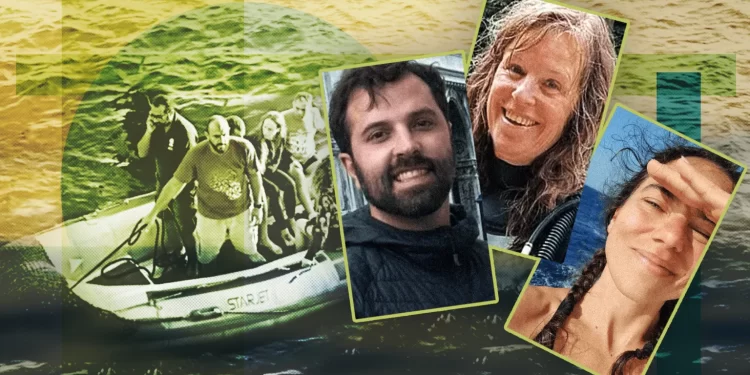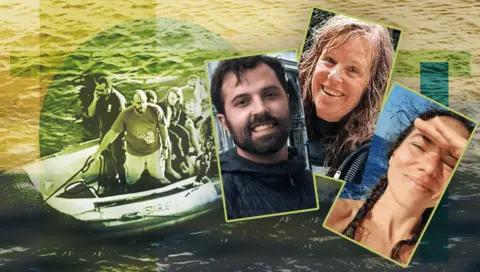 BBC
BBCSurvivors of a deadly dive-boat sinking in the Red Sea say they were pressured to sign official witness statements in Arabic – which they couldn’t understand and had been translated from English by an employee of the boat company.
They say the man also tried to get them to sign waivers which stated they did not accuse anyone of “criminal wrongdoing”.
The 11 survivors who have spoken to the BBC have also accused the Egyptian authorities of trying to cover up what happened, saying investigators were determined to blame it on a huge wave.
The Sea Story had been carrying 46 people when it sank in the early hours of 25 November last year – four bodies were recovered and seven people are still missing, including two British divers.
Neither the Egyptian government nor the boat operators – Dive Pro Liveaboard, based in Hurghada – have responded to our questions.
On Tuesday, the BBC revealed multiple accusations from survivors of safety failings on board the vessel. A leading oceanographer who analysed weather data also said it was not plausible that a huge wave had hit the vessel.
‘Interrogated’ from hospital beds
Within hours of being brought ashore, survivors say they were subjected to what one described as “an interrogation”, some from their hospital beds, by people they were told were judges.
Those who didn’t need hospital treatment were interviewed at a nearby resort, said other survivors, who reported the same feelings of being pressured.
“We were told we couldn’t leave the room until they’d done everybody’s statements,” says Sarah Martin, an NHS doctor from Lancashire.
The judges were part of an Egyptian investigation into what caused the sinking – though survivors say it was not clear exactly who was leading it.
Watch: Sea Story survivors return to the safety of dry land
The survivors say having their initial statements translated into Arabic by an employee of the company that owned the Sea Story was a clear conflict of interest.
Spanish diver Hissora Gonzalez said the man did not initially introduce himself as an employee. “He just said, ‘You have to tell me what happened, and then you have to sign this piece of paper.'”
It was not until later, say several people we spoke to, that the man told them he worked for Dive Pro Liveaboard.
The survivors say that, after being translated by the man, their statements were handed to investigators – something that shocked Lisa Wolf. “A normal judge can’t take a translation from someone that’s obviously totally involved in the process.”
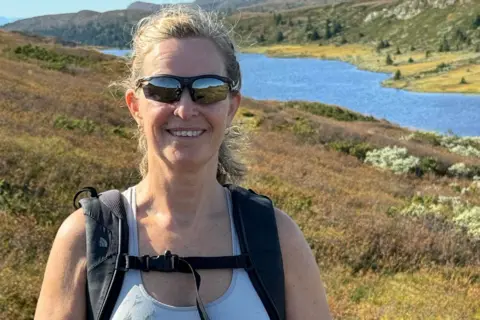 Frøydis Adamson
Frøydis AdamsonOne survivor, who is a Norwegian police investigator, said she had “no clue” what the four pages of Arabic handed back to her actually said. “They could have written anything. I don’t know what I signed,” Frøydis Adamson explained. Under her signature she says she wrote that she had not been able to read the documents.
“We were in such shock and just wanted to go home,” said Hissora.
‘Release of liability document’
Representatives of the boat operators, Dive Pro Liveaboard, also repeatedly tried to push people into signing waivers – say survivors – which would have seen them agreeing to the statement: “I do not accuse anyone of any criminal wrongdoing.”
Justin Hodges, an American diver who was also rescued, told us the “release of liability document”, written in English, was handed to him as he was giving his witness statement.
He said he had thought the person he was talking to was “an official”, but at this point learned that he worked for the company.
“He slid in with the authorities,” says Justin. “The fact he tried to get us to release liability at that moment was insane to me.”
At least some of the people we spoke to didn’t sign the document.
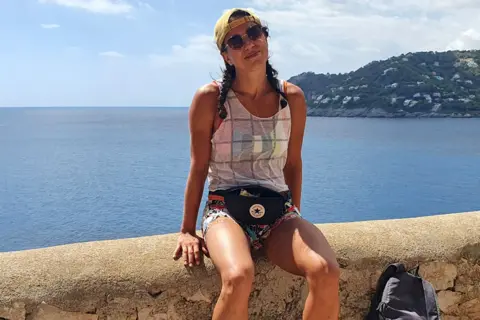 Lisa Wolf
Lisa WolfEveryone we spoke to said they had not been allowed to keep copies of their statements, but the BBC was told some people had managed to translate the documents with their phones. Many of those told us that key, damning details which they had conveyed verbally were left out of the paperwork.
“Everything about the condition of the life rafts and safety issues on the boat went away,” says Lisa.
Sarah and Hissora reported the same experience. “They just put whatever they wanted,” says Hissora.
‘The only one responsible is the sea’
Survivors also say the authorities seemed determined to blame the tragedy on a huge wave from the outset.
That is despite many of those rescued saying the waves were not too big to stop them swimming. A leading oceanographer has told the BBC that contemporaneous meteorological data from the nearest airport strongly supports the survivors’ recollections.
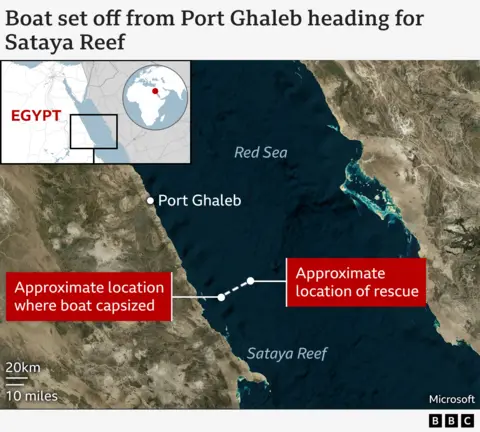
Hissora asked if she could eventually see a copy of the investigators’ final report, but says she was told there was no need. “[It’s like] they already knew the cause was a wave,” she says.
When she asked again, Hissora said she was told “the only one responsible for this is the sea”. She believes the authorities had already made up their minds before the investigation had even begun.
Hissora’s concerns are shared by Sarah, who says the judges were also “very eager” that survivors didn’t blame anyone for the accident.
Multiple survivors say they were told that if they wanted to hold anyone responsible, they had to name an individual and specific crime of which they were accused.
“Just because I couldn’t name the person and the crime, it didn’t mean someone wasn’t to blame,” says Sarah.
A final attempt by Dive Pro Liveaboard to get survivors to sign waivers was made as one group tried to leave for Cairo, says Justin.
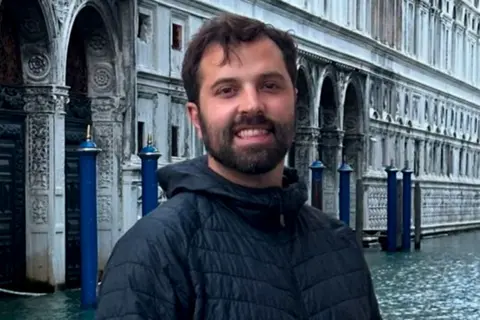 Justin Hodges
Justin HodgesHaving lost their passports at sea, he says the group was told by a company representative that the documents being presented to them were clearance papers to get through checkpoints.
“But then I get to the bottom and the last sentence is the same release of liability question,” – a repeat of the one he says he was asked to sign when he gave his witness statement.
Justin says he went to alert the others and, when he returned to the man who he believed was trying to mislead him, the papers had “magically disappeared” and been replaced with more official-looking documents.
“My blood was boiling,” he says.
The BBC has not seen the waiver documents or copies of them.
UK couple still missing
Among the missing are two Britons, Jenny Cawson and Tarig Sinada from Devon.
“They were the kindest, most caring and generous souls,” says Andy Williamson, a friend of the couple.
He says their family has constantly received partial and inaccurate news from the Egyptian government.
For example, after the disaster they say they were told the boat had not been found – despite the fact they saw on TV survivors from the wreck being brought ashore. They are calling for an open investigation.
“It would appear that Egyptian authorities are doing their very best to kind of sweep this under the carpet,” says Andy. “They want to protect their tourism industry.”
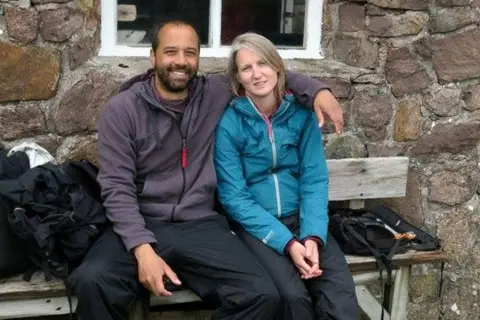
In March, a fire on another Dive Pro Liveaboard boat – the Sea Legend – killed a German tourist.
Last year, Maritime Survey International, an independent consultancy, produced a report on the safety of dive boats in the Red Sea. It inspected eight vessels, although not including any operated by Dive Pro Liveaboard, and found none had “a planned maintenance system, safety management system or stability books”, a crucial document for avoiding capsize.
It also found design standards to be “poor with all the vessels lacking watertight bulkheads, doors and hatches”.
It concluded that not a single vessel was safe and the dive boat industry in Egypt “plies its trade largely unregulated”.
On 7 January, a group of 15 survivors, including many of those we spoke to, emailed Egypt’s Chamber of Diving and Water Sports (CDWS), which regulates all diving activities and is linked to the Ministry of Tourism.
They relayed their safety concerns and questioned why Dive Pro Liveaboard was still able to operate. The CDWS managing director replied on 9 January and said there was an ongoing investigation into the case, which was being taken “very seriously”.
He added that “appropriate action” would be taken “against any negligence … that resulted in the compromise of people’s safety”.

